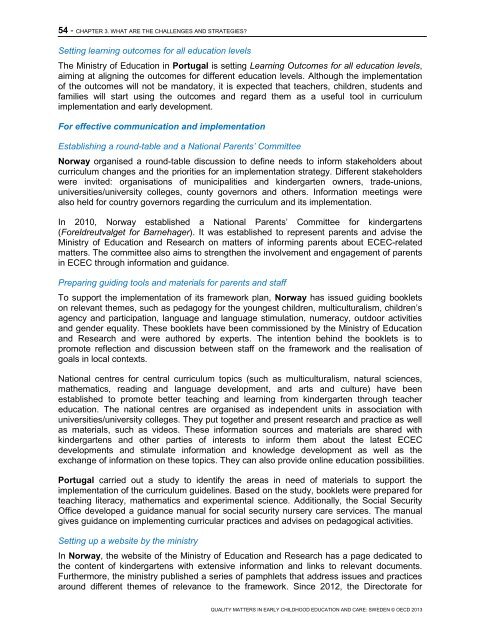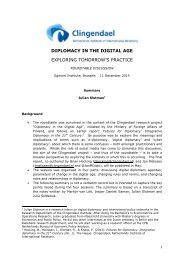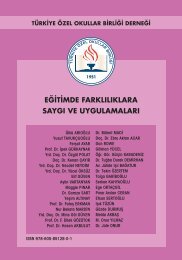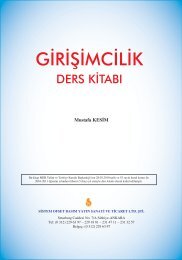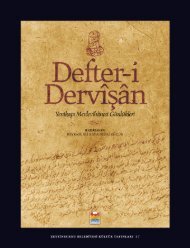SWEDEN%20policy%20profile%20-%20published%2005-02-2013
SWEDEN%20policy%20profile%20-%20published%2005-02-2013
SWEDEN%20policy%20profile%20-%20published%2005-02-2013
Create successful ePaper yourself
Turn your PDF publications into a flip-book with our unique Google optimized e-Paper software.
54 - CHAPTER 3. WHAT ARE THE CHALLENGES AND STRATEGIES?<br />
Setting learning outcomes for all education levels<br />
The Ministry of Education in Portugal is setting Learning Outcomes for all education levels,<br />
aiming at aligning the outcomes for different education levels. Although the implementation<br />
of the outcomes will not be mandatory, it is expected that teachers, children, students and<br />
families will start using the outcomes and regard them as a useful tool in curriculum<br />
implementation and early development.<br />
For effective communication and implementation<br />
Establishing a round-table and a National Parents’ Committee<br />
Norway organised a round-table discussion to define needs to inform stakeholders about<br />
curriculum changes and the priorities for an implementation strategy. Different stakeholders<br />
were invited: organisations of municipalities and kindergarten owners, trade-unions,<br />
universities/university colleges, county governors and others. Information meetings were<br />
also held for country governors regarding the curriculum and its implementation.<br />
In 2010, Norway established a National Parents’ Committee for kindergartens<br />
(Foreldreutvalget for Barnehager). It was established to represent parents and advise the<br />
Ministry of Education and Research on matters of informing parents about ECEC-related<br />
matters. The committee also aims to strengthen the involvement and engagement of parents<br />
in ECEC through information and guidance.<br />
Preparing guiding tools and materials for parents and staff<br />
To support the implementation of its framework plan, Norway has issued guiding booklets<br />
on relevant themes, such as pedagogy for the youngest children, multiculturalism, children’s<br />
agency and participation, language and language stimulation, numeracy, outdoor activities<br />
and gender equality. These booklets have been commissioned by the Ministry of Education<br />
and Research and were authored by experts. The intention behind the booklets is to<br />
promote reflection and discussion between staff on the framework and the realisation of<br />
goals in local contexts.<br />
National centres for central curriculum topics (such as multiculturalism, natural sciences,<br />
mathematics, reading and language development, and arts and culture) have been<br />
established to promote better teaching and learning from kindergarten through teacher<br />
education. The national centres are organised as independent units in association with<br />
universities/university colleges. They put together and present research and practice as well<br />
as materials, such as videos. These information sources and materials are shared with<br />
kindergartens and other parties of interests to inform them about the latest ECEC<br />
developments and stimulate information and knowledge development as well as the<br />
exchange of information on these topics. They can also provide online education possibilities.<br />
Portugal carried out a study to identify the areas in need of materials to support the<br />
implementation of the curriculum guidelines. Based on the study, booklets were prepared for<br />
teaching literacy, mathematics and experimental science. Additionally, the Social Security<br />
Office developed a guidance manual for social security nursery care services. The manual<br />
gives guidance on implementing curricular practices and advises on pedagogical activities.<br />
Setting up a website by the ministry<br />
In Norway, the website of the Ministry of Education and Research has a page dedicated to<br />
the content of kindergartens with extensive information and links to relevant documents.<br />
Furthermore, the ministry published a series of pamphlets that address issues and practices<br />
around different themes of relevance to the framework. Since 2012, the Directorate for<br />
QUALITY MATTERS IN EARLY CHILDHOOD EDUCATION AND CARE: SWEDEN © OECD <strong>2013</strong>


